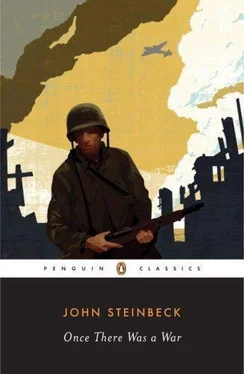John Steinbeck - Once there was a war
Здесь есть возможность читать онлайн «John Steinbeck - Once there was a war» весь текст электронной книги совершенно бесплатно (целиком полную версию без сокращений). В некоторых случаях можно слушать аудио, скачать через торрент в формате fb2 и присутствует краткое содержание. Город: New York, Год выпуска: 1960, Издательство: Bantam Books, Жанр: Классическая проза, на английском языке. Описание произведения, (предисловие) а так же отзывы посетителей доступны на портале библиотеки ЛибКат.
- Название:Once there was a war
- Автор:
- Издательство:Bantam Books
- Жанр:
- Год:1960
- Город:New York
- ISBN:нет данных
- Рейтинг книги:3 / 5. Голосов: 1
-
Избранное:Добавить в избранное
- Отзывы:
-
Ваша оценка:
- 60
- 1
- 2
- 3
- 4
- 5
Once there was a war: краткое содержание, описание и аннотация
Предлагаем к чтению аннотацию, описание, краткое содержание или предисловие (зависит от того, что написал сам автор книги «Once there was a war»). Если вы не нашли необходимую информацию о книге — напишите в комментариях, мы постараемся отыскать её.
Once there was a war — читать онлайн бесплатно полную книгу (весь текст) целиком
Ниже представлен текст книги, разбитый по страницам. Система сохранения места последней прочитанной страницы, позволяет с удобством читать онлайн бесплатно книгу «Once there was a war», без необходимости каждый раз заново искать на чём Вы остановились. Поставьте закладку, и сможете в любой момент перейти на страницу, на которой закончили чтение.
Интервал:
Закладка:
SOMEWHERE IN THE MEDITERRANEAN THEATER, October 4, 1943 —
There is a good beach at Salerno, and a very good landing at Red Beach No. 2. The ducks were coming loaded ashore and running up out of the water and joining the lines of trucks, and the pontoon piers were out in the water with large landing cars up against them. Along the beach the bulldozers were at work pushing up sand ramps for the trucks to land on and just back of the beach were the white tapes that mean land mines have not been cleared out.
There are little bushes on the sand dunes at Red Beach, south of the Sele River, and in a hole in the sand buttressed by sandbags a soldier sat with a leather-covered steel telephone beside him. His shirt was off and his back was dark with sunburn. His helmet lay in the bottom of the hole and his rifle was on a little pile of brush to keep sand out of it. He had staked a shelter half on a pole to shade him from the sun, and he had spread bushes on top of that to camouflage it. Beside him was a water can and an empty C-ration can to drink out of.
The soldier said, “Sure you can have a drink. Here, I’ll pour it for you.” He tilted the water can over the tin cup. “I hate to tell you what it tastes like,” he said.
I took a drink. “Well, doesn’t it?” he said.
“It sure does,” I said.
Up in the hills the.88s were popping and the little bursts threw sand about. His face was streaked where the sweat had run down through the dirt, and his hair and his eyebrows were sunburned almost white. But there was a kind of gaiety about him. His telephone buzzed and he answered it and said, “Hasn’t come through yet, sir, no sir I’ll tell him.” He clicked off the phone.
“When’d you come ashore?” he asked. And then, without waiting for an answer, he went on. “I came in just before dawn yesterday. I wasn’t with the very first, but right in the second.” He seemed to be very glad about it. “It was hell,” he said, “it was bloody hell.” He seemed to be gratified at the hell it was, and that was right. The great question had been solved for him. He had been under fire. He knew now what he would do under fire. He would never have to go through that uncertainty again. “I got pretty near up to there,” he said, and pointed to two beautiful Greek temples about a mile away. “And then I got sent back here for beach communications. When did you say you got ashore?” And again he didn’t wait for an answer.
“It was dark as hell,” he said, “and we were just waiting out here,” He pointed to the sea where the mass of the invasion fleet rested. “If we thought we were going to sneak ashore we were nuts,” he said. “They were waiting for us. They knew just where we were going to land. They had machine guns in the sand dunes and.88s on the hills.
“We were out there all packed in an LCI, and then all hell broke loose. The sky was full of it and the star shells lighted it up and the tracers crisscrossed and the noise — we saw the assault go in, and then one of them hit a surf mine and went up, and in the light you could see them go flying about. I could see the boats land and the guys go wiggling and running, and then maybe there’d be a lot of white lines and some of them would waddle about and collapse and some would hit the beach.
“It didn’t seem like men getting killed, more like a picture, like a moving picture. We were pretty crowded up in there, though, and then all of a sudden it came on me that this wasn’t a moving picture. Those were guys getting the hell shot out of them, and then I got kind of scared, but what I wanted to do mostly was move around. I didn’t like being cooped up there where you couldn’t get away or get down close to the ground.
“Well, the firing would stop and then it would get pitch black even then, and it was just beginning to get light too, but the.88s sort of winked on the hills like messages, and the shells were bursting all around us. They had lots of.88s and they shot at everything. I was just getting real scared when we got the order to move in, and I swear that is the longest trip I ever took, that mile to the beach. I thought we’d never get there. I figured that if I was only on the beach I could dig down and get out of the way. There was too damned many of us there in that LCI. I wanted to spread out. That one that hit the mine was still burning when we went on by it. Then we bumped the beach and the ramps went down and I hit the water up to my waist.
“The minute I was on the beach I felt better. It didn’t seem like everybody was shooting at me and I got up to that line of brush and flopped down and some other guys flopped down beside me and then we got feeling a little foolish. We stood up and moved on. Didn’t say anything to each other, we just moved on. It was coming daylight then and the flashes of the guns weren’t so bright. I felt a little like I was drunk. The ground heaved around under my feet and I was dull. I guess that was because of the firing. My ears aren’t so good yet. I guess we moved up too far because I got sent back here.” He laughed openly. “I might have gone on right into Rome if someone hadn’t sent me back. I guess I might have walked right up that hill there.”
The cruisers began firing on the hill and the.88s fired back. From over near the hill came the heavy thudding of.59-caliber machine guns. The soldier felt pretty good. He knew what he could do now. He said, “When did you say you came ashore?”
MEDITERRANEAN THEATER, October 6, 1943 —
You can’t see much of a battle. Those paintings reproduced in history books which show long lines of advancing troops are either idealized or else times and battles have changed. The account in the morning papers of the battle of yesterday was not seen by the correspondent, but was put together from reports.
What the correspondent really saw was dust and the nasty burst of shells, low bushes and slit trenches. He lay on his stomach, if he had any sense, and watched ants crawling among the little sticks on the sand dune, and his nose was so close to the ants that their progress was interfered with by it.
Then he saw an advance. Not straight lines of men marching into cannon fire, but little groups scuttling like crabs from bits of cover to other cover, while the high chatter of machine guns sounded, and the deep proom of shellfire.
Perhaps the correspondent scuttled with them and hit the ground again. His report will be of battle plan and tactics, of taken ground or lost terrain, of attack and counter-attack. But these are some of the things he probably really saw:
He might have seen the splash of dirt and dust that is a shell burst, and a small Italian girl in the street with her stomach blown out, and he might have seen an American soldier standing over a twitching body, crying. He probably saw many dead mules, lying on their sides, reduced to pulp. He saw the wreckage of houses, with torn beds hanging like shreds out of the spilled hole in a plaster wall. There were red carts and the stalled vehicles of refugees who did not get away.
The stretcher-bearers come back from the lines, walking in off step, so that the burden will not be jounced too much, and the blood dripping from the canvas, brother and enemy in the stretchers, so long as they are hurt. And the walking wounded coming back with shattered arms and bandaged heads, the walking wounded struggling painfully to the rear.
He would have smelled the sharp cordite in the air and the hot reek of blood if the going has been rough. The burning odor of dust will be in his nose and the stench of men and animals killed yesterday and the day before. Then a whole building is blown up and an earthy, sour smell comes from its walls. He will smell his own sweat and the accumulated sweat of an army. When his throat is dry he will drink the warm water from his canteen, which tastes of disinfectant.
Читать дальшеИнтервал:
Закладка:
Похожие книги на «Once there was a war»
Представляем Вашему вниманию похожие книги на «Once there was a war» списком для выбора. Мы отобрали схожую по названию и смыслу литературу в надежде предоставить читателям больше вариантов отыскать новые, интересные, ещё непрочитанные произведения.
Обсуждение, отзывы о книге «Once there was a war» и просто собственные мнения читателей. Оставьте ваши комментарии, напишите, что Вы думаете о произведении, его смысле или главных героях. Укажите что конкретно понравилось, а что нет, и почему Вы так считаете.









